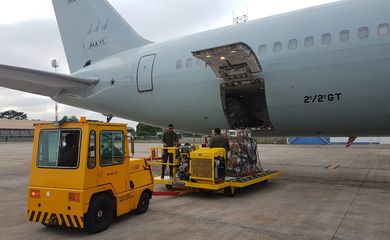Brazilian military agents talk about their experience in Mozambique


“The disaster here was considerably more devastating than in Brumadinho, with areas affected stretching over 500 km. A lot of people are still in need of assistance.” The statement was made by Sargent Michel Santana, one of the members of the Brazilian team in Mozambique helping rescue victims in the region hit by cyclone Idai on March 4.

The Brazilian teams started their efforts early this month, in support of the victims of the cyclone that left hundreds dead and destroyed whole regions in the country. They are likely to spend 30 days on the scene, taking part in rescue operations in the most severely affected areas.
The group is made up of 20 firefighters from the search team of the National Public Security Force and another 20 military agents who worked in the rescue operations following the dam collapse of the Córrego de Feijão mine in February, in Brumadinho, Minas Gerais state. They became known as heroes after their search for survivors. The teams were taken on a Brazilian Air Force (FAB) aircraft, along with vehicles, boats, and other equipment provided by the National Force and the Fire Department of Minas Gerais.
Help for those who need it
In Mozambique, they help those in need and make room for the work of hundreds of helpers from UN agencies in the aftermath of cyclone Idai. After the disaster, the country also welcomed aid from the Armed Forces of nations like Angola, South Africa, Portugal, and Israel. The cyclone forced over 3 people out of their homes and left some 750 people dead in Mozambique, Malawi, and Zimbabwe.
The mission conducted by Brazilian troops and firefighters in the African country is still necessary, as stated by National Disasters Management Institute of Mozambique Director-General Augusta Maíta, who received the group. “We need to reach the portion of our population we cannot reach via land or sea.”
The country—the most direly devastated by the cyclone—confirmed a death toll of 598, a number rising as agents gain more and more access to areas previously isolated. This operation is likely to last for yet some time, said Brazil’s Ambassador to Mozambique Carlos Alfonso Puente. “The moment they arrive is the moment some of the helpers are leaving. There’s still a lot to be done,” he said.
In the view of Major Wagner da Silva, the expertise brought from Brumadinho is a valuable addition to what is being done in Mozambique. “Most of those working here, in the National Force, work alongside other public security agencies, in the efforts to salvage bodies and offer assistance in Brazil.”
Back in the mud
The Brazilian military agents and firefighters landed in Mozambique to spearhead the operation in the Búzi region, near the city of Beira, after an appeal was made both in Brazil and overseas. The threat posed and the damage caused by the water led to focus being directed at victims in this region.
They describe how they arrived in the place after the disaster. “Right after we landed here, we could have a better idea of what was happening, because the devastation and the poor structure and sanitation made aid efforts more difficult and the conditions facing the victims worse,” Major Wagner da Silva pointed out.
In the search operations, predicting when the next buried victim will be found can be challenging. But one thing is certain about the action of these officials: their work is worth more than a thousand words. Sublieutenant Gilmas Viana said the efforts are too little to benefit the affected communities: “We see a city virtually devastated by the cyclone, but, within the possibilities, as the human beings we are, we’ll do everything we can so that the little we can do can have an effect on people’s lives.”
“We had Brumadinho in 2019, and, joining in the international operation in Mozambique, all this allows us to bring together planning and execution. This makes a lot of difference because it lets us adapt more quickly to the event, the situation, and the need,” Sargent Michel Santana said.
These men are sure to spend their next days further inspecting the mud after the havoc wreaked by cyclone Idai. While the military agents and firefighters strive to save lives, they notice the similarities between the two disasters and reiterate the commitment to start working with no fixed time to rest, joining efforts with the humanitarian aid from the international community.
*With information from UN News



